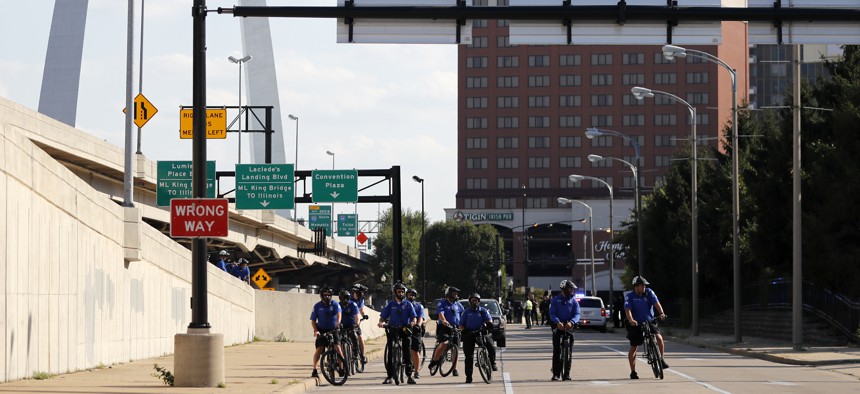St. Louis Police Will No Longer Have to Reside Within City Limits

Police officers guard the streets as protesters gather, Friday, Sept. 15, 2017, in downtown St. Louis. AP Photo/Jeff Roberson
By temporarily doing away with the city’s residency requirement for first responders, St. Louis officials hope it will become easier to recruit and hire officers to fill current vacancies.
The St. Louis Police Department hasn’t been fully staffed for years, with local officials suggesting recruitment is difficult due to a requirement that new hires live in the city limits.
“For as long as I’ve been an alderman, we’ve been down 100 officers,” said St. Louis City Alderman Jeffery Boyd, who was first elected in 2003, at a recent public safety meeting.
But under a bill signed into law this week by Missouri Gov. Mike Parson, the city will temporarily loosen its residency requirement—a change officials hope will boost recruiting efforts and enable them to fill current vacancies.
The St. Louis Police Department is currently short 129 officers from its authorized capacity of 1,349 officers.
St. Louis Police Chief John Hayden said if the department is able to double the number of recruits under the law, it could close that gap within a year.
“In an average year, our attrition rate and our hiring rate pretty much balances out,” Hayden said Tuesday at a Public Safety Committee meeting.
Hayden admitted he wasn’t sure how realistic it is to project a doubling of recruitment, but he said if that happened “it’s possible we could make a lot of headway in the first year with that bill being passed.”
While police residency requirements have come under some scrutiny in recent years as cities faced recruiting challenges, they also found proponents, particularly in cities where few officers live in the communities they patrol.
Some cities like Philadelphia have gone the opposite direction than St. Louis, exploring the idea of reinstating residency requirements as a means of police reform. Some activists and lawmakers contend that if officers live in the cities where they work, it will help diversify departments and improve community relations.
In St. Louis, Alderman Megan Green told the St. Louis Post-Dispatch that the push to scrap the requirement—which dates back to 1973 and specifically requires officers to live in the city for seven years before they are allowed to move away—is out of step with the nationwide focus on broader reforms at police departments.
“Cities and activists are saying it’s important we have police connected to the communities,” Green said.
The move comes at a time that the city is experiencing a surge in violence. St. Louis recorded its 200th homicide Thursday and if the pace of killings continues, the city could record its highest number of homicides in 25 years.
Opponents of the city’s residency mandate have sought to repeal it for years, saying it will allow the city to cast a wider net for recruits. But the legislation passed by state lawmakers this summer only does away with the seven-year residency requirement temporarily. Under the law, anyone hired by either the police or fire department before September 2023 will not be required to live in the city limits.
St. Louis residents will have the chance to weigh in on the issue in November, when they will vote on whether or not to permanently lift a residency requirement for almost all city employees.
While Missouri’s state-imposed decision to lift residency requirements for a city police department may be unique, the problem of police recruitment is not.
Across the country, police departments of all sizes have experienced difficulty recruiting and keeping police officers, according to the Police Executive Research Forum.
“Fewer people are applying to become police officers, and more people are leaving the profession, often after only a few years on the job,” PERF researchers wrote in a 2019 study of law enforcement workforce issues.
Sixty-three percent of agencies surveyed by PERF said the number of applications they received for open police officer positions had decreased in the last five years—with 36% saying the number had decreased significantly and 27% saying it decreased slightly.
Other factors contributing to the staffing problem include the growing percentage of officers eligible for retirement, thanks to a surge in hiring in the 1990s that was spurred through federal hiring grants, and movement of officers between police agencies.
Andrea Noble is a staff correspondent with Route Fifty.
NEXT STORY: Plea Bargaining Needs to be More Transparent, Report Argues





